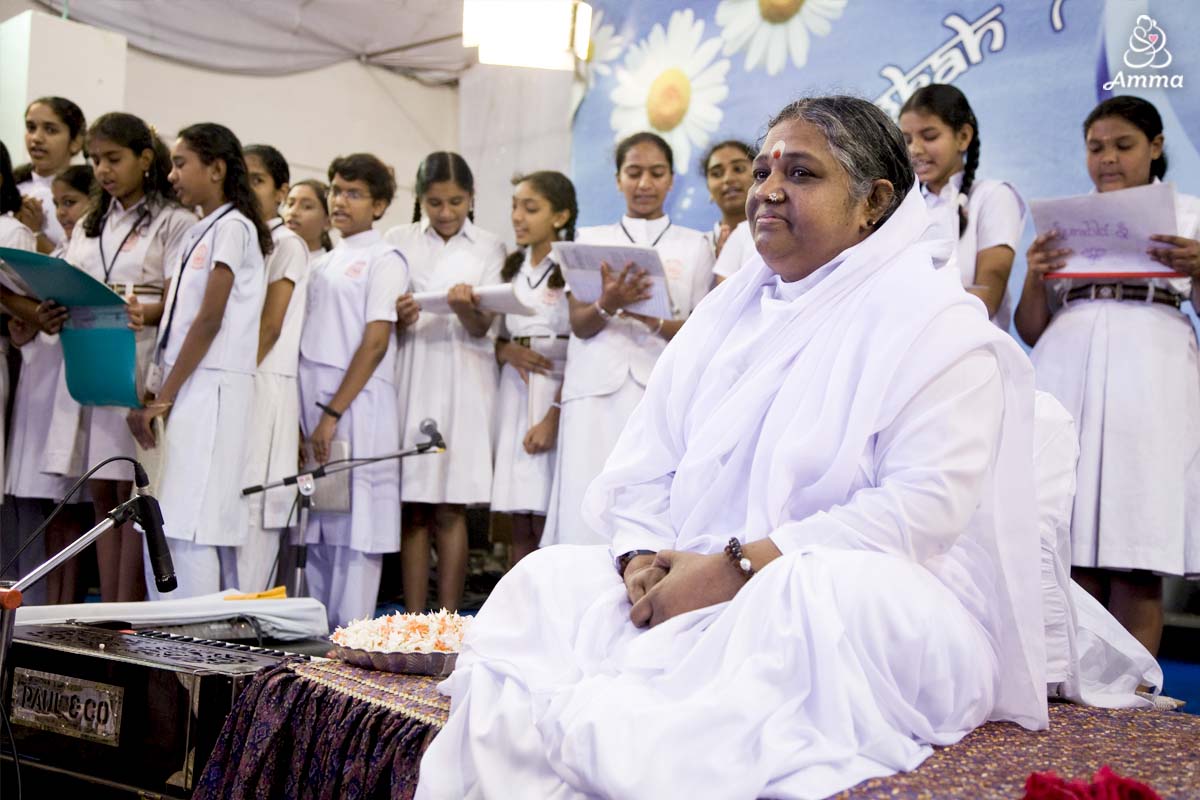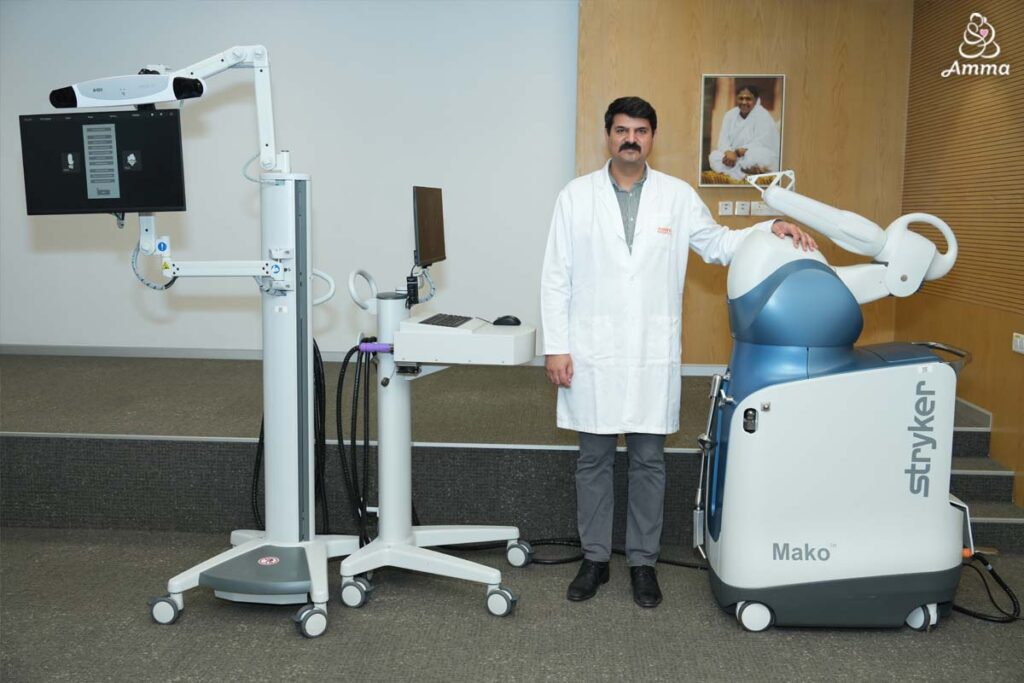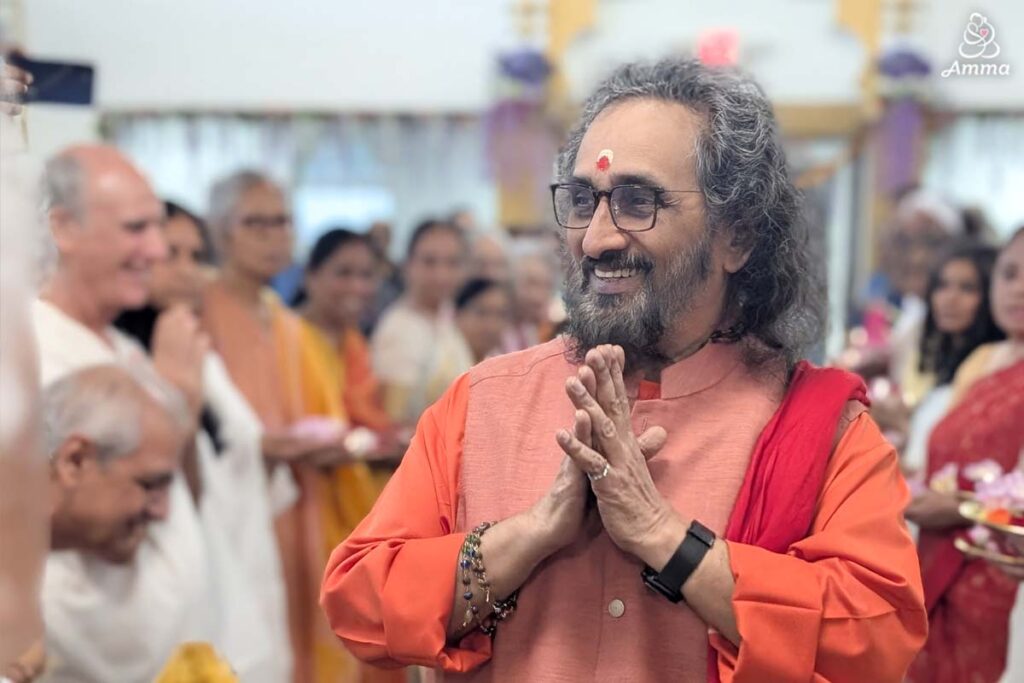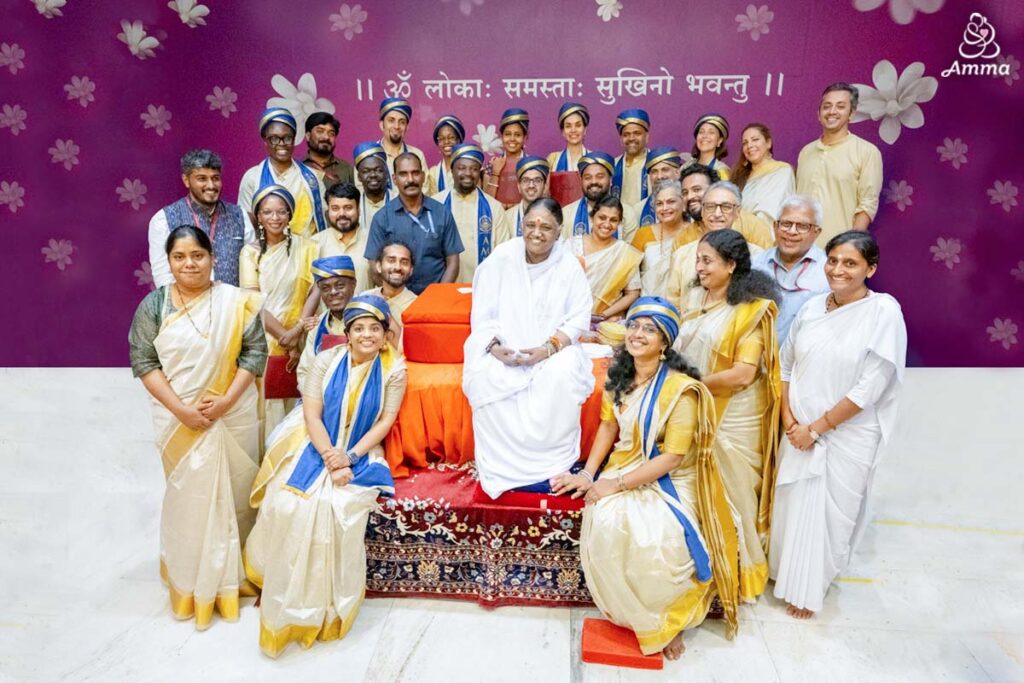It was a gathering of universities from across India to share a vision for education that brings together material and spiritual knowledge. ‘Education for a Developed Bharat – A Roadmap’ was jointly organised by Shiksha Sanskriti Utthan Nyas and Amrita University, and took place at Amrita Hospital, Kochi July 27 & 28.
In a deeply inspiring video message as Chancellor, Amma shared how the link that binds the individual, society, life and nature is dharma—ethical values. A revival of this universal knowledge system from ancient India has the power to unite humanity through love, compassion and peace.
Excerpts from Amma’s Address
Bhāratam—“that which revels in light.” Meaning, that which revels in the light of knowledge is Bhāratam. When we reflect upon the depth and vastness of the diverse sciences and disciplines that flourished in ancient India, we understand how truly fitting the name Bhāratam is for this land.
Not only the sages, but even the common people were immersed in knowledge. Culture, like ghee emerging from churned milk, is born from true knowledge. True culture is compassion for all living beings and a sense of oneness with all of nature. Bhāratam’s sages were immersed in this very spirit. Even the ordinary people of Bhāratam internalised this feeling in their hearts.
India is the land of sages. It was they who handed down to us the eternal values of Sanātana Dharma, which bring welfare and the highest good to the entire world. The hallmarks of this ancient culture are the highest vision of truth and a boundless compassion that flows forth to all living beings. All of creation is pervaded by one divine consciousness. It is from this vision of oneness that true compassion for all beings arises.
Ancient knowledge for modern times
Because all beings are diverse expressions of the one divine truth, India’s culture has taught us to honour, revere and serve even the tiniest forms of life. If the left hand is in pain, the right hand gently soothes it—because both are part of the same body. The pain of one is the pain of the other; the wellbeing of one is the wellbeing of the other. Thus, this ancient knowledge teaches us to see others’ suffering as our own and their joy as our own as well.
This is the ultimate goal of both knowledge and education. For example, even though the Sun becomes reflected in 100 pots of water, there is still only one Sun. Similarly, the all-pervading ātmā is essentially one.
According to Sanātana Dharma, the creation and the Creator are one, not separate. Gold exists within gold ornaments, and gold ornaments exist within gold. Seeing the one divine consciousness in everything, try to love and serve others selflessly. This is the fundamental principle our ancient ṛṣis taught us.
In earlier times, our schools were deeply rooted in values. Even as that foundation gradually faded, those values continued to be passed down through the home—through parents and grandparents. But even that source has been steadily diminishing.
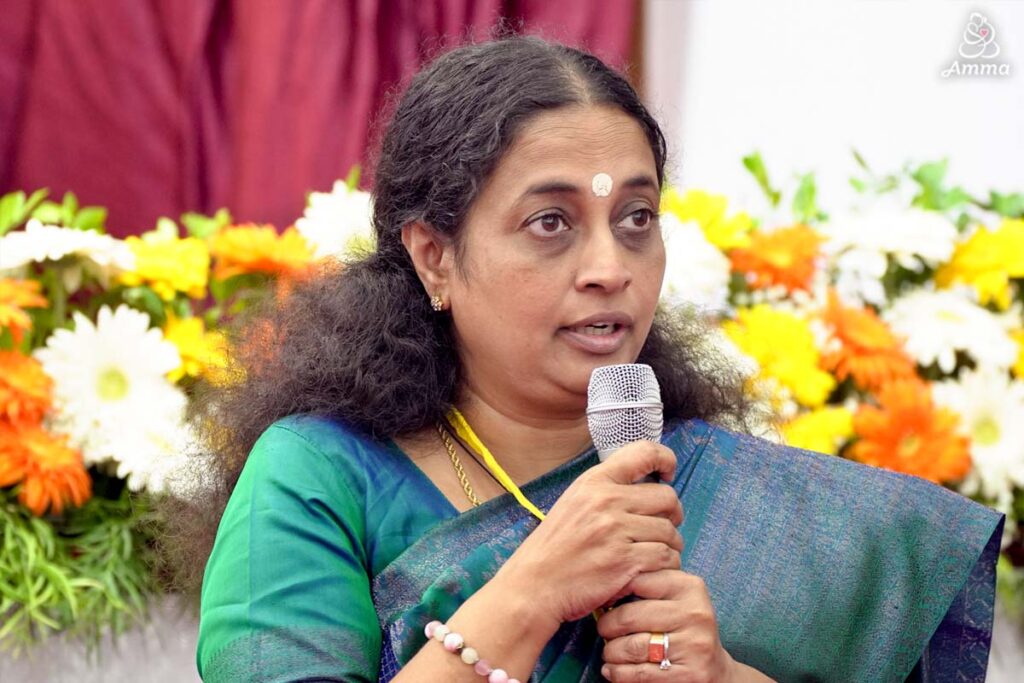
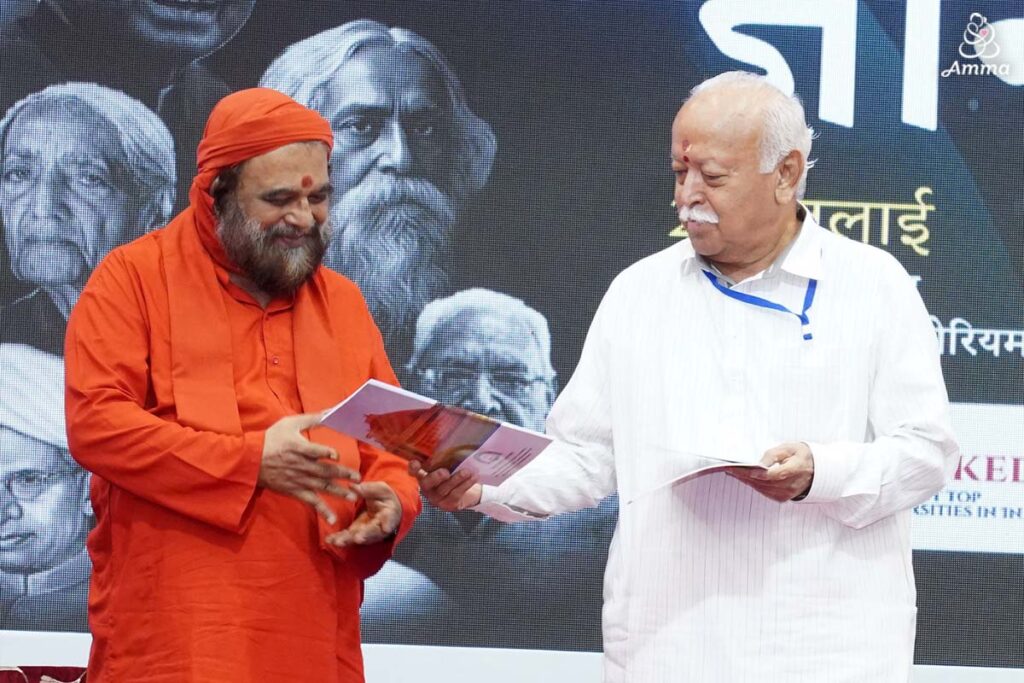
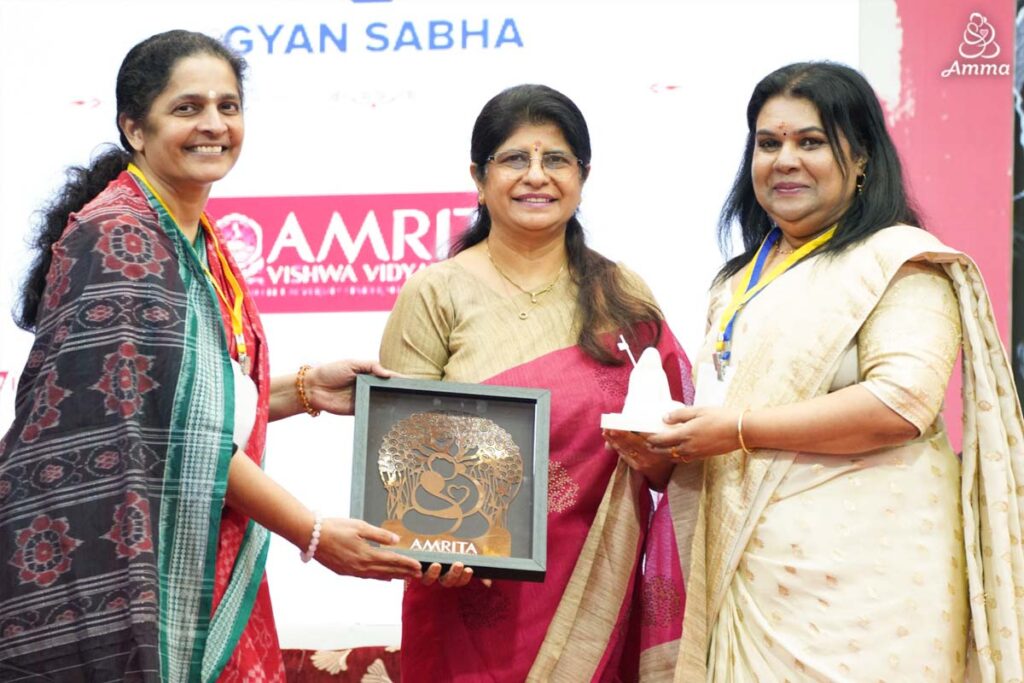
Showing gratitude to Mother Earth
Here, I remember my mother. Every morning, as soon as she woke up, she would prostrate to the earth three times. Our birth mother may carry us on her lap for a few years, but Mother Earth carries us on her lap our entire life, giving us all her abundant resources.
Prostrating to her three times each morning is a way of expressing our deep gratitude for her constant, selfless giving. It is we who reap the benefit when we show such gratitude. After sleeping for eight hours at night, the blood flow to the brain should be regulated. Bending down in respect to the Earth facilitates this. This small gesture of gratitude doesn’t benefit the Earth in any way, but its practice benefits us. Through that attitude, we are the ones gaining strength.
After bowing to the Earth, Damayanti Amma would offer prayers to the Sun—another act of gratitude that benefits us. The Sun provides our bodies with Vitamin D, which strengthens our muscles and bones and even supports memory. Countries with limited sunlight often report higher rates of depression and suicide. So, even as we express our gratitude, we are also receiving tangible physical and mental benefits in return.
From my early childhood, my mother taught me that the river was an embodiment of Devī and that we should never urinate or spit in it. Every time Amma got into the river to bathe, the cold water would prompt the urge to urinate, but because my mother’s lesson was ingrained in us from childhood, I could control it. Amma learned three lessons from this:
1. What you give is what you get back.
2. It is not the river that is benefited but we, who bathe in it daily.
3. If we have the right values, we can have self-control in any adverse situation.
A world in need of self-control
Living in today’s world is like standing in the middle of a giant supermarket, surrounded by endless temptations. Not salivating when sugar is placed on your tongue is no easy task. Similarly, we have become slaves to our thoughts and emotions. Crimes like rape are reported to be increasing among the youth. This is largely due to a lack of proper values.
For example, take mobile phones. They have both positive and negative aspects. When an immature mind is exposed to inappropriate content, their base instincts and emotions are triggered. In the absence of a strong moral foundation, they become unable to control themselves. They do not even consider who is around them.
Having lost awareness and self-restraint, they descend into a state where they will assault and rape. In such moments, all compassion is lost. Those instilled with morals early in life, however, will be able to exercise self-control.
This is what I learned from my mother’s instruction of not urinating in the river. The respect we show the river is not for the river’s benefit, but for our own. The respect we show the Sun is not for the Sun’s benefit, but for our own. The respect we show the Earth is not for the Earth’s benefit, but for our own. The respect we show the trees is not for the trees’ benefit, but for our own. At the same time, such respect also sustains everything in creation.
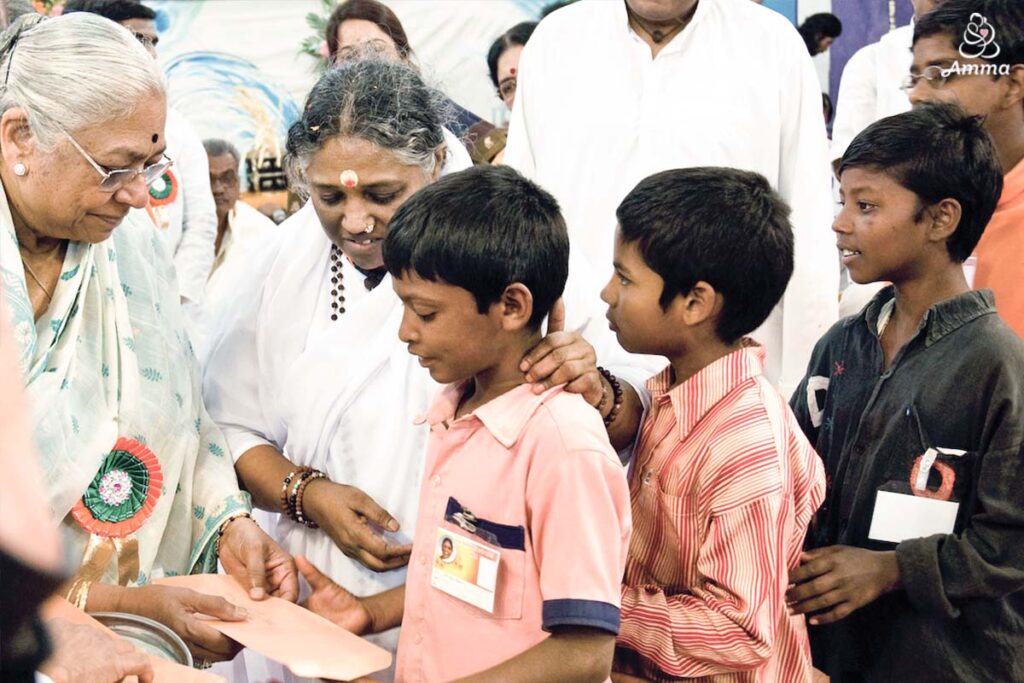
Education to eradicate two types of poverty
In today’s world, universities are multiplying and student enrolment is steadily rising. Millions of books are being published on a wide range of subjects, and new research is constantly uncovering fresh knowledge. In the effort to empower women, educational opportunities for them are expanding as well. Undoubtedly, all of this reflects signs of progress in our society.
But while, on the one hand, we witness such remarkable achievements. On the other, there is a sharp rise in mental stress and clinical depression. Conflicts and unrest are increasing in society. Divorces are increasing. Marital relationships are not rooted in love. Spouses only think about their own selfish interests. If we don’t understand the language of the heart, there will be no communication, and such things will happen. This is how family relationships fall apart.
From all this, one thing is clear: Somewhere along the way, we have made a mistake. Just like a flower and its fragrance, a word and meaning and a lamp and its light, so too jñānam and viveka—knowledge and discernment—must go hand in hand. Today, although knowledge has grown, it feels as if while the Sun has risen darkness remains.
There are two types of poverty in this world: One is lack of food, clothing and shelter; the other is lack of love and compassion. But if we have love and compassion, then the poverty of food, clothing and shelter will naturally be eliminated. These are the dharmic values advocated by Amma and Sanātana Dharma. This is what we must strive to revive. This is why Amma started educational institutions.
Learning through living in 2,200 impoverished villages across India
Our youth are increasingly drifting away from dharmic values. Their mindset has become one of constant taking—take, take and take more. To address this, Amma initiated a project called Live-in-Labs, impacting 2,200 villages.
As part of this, we brought university students to rural communities. There, they witness the realities of rural life and are given the opportunity to actively interact with the villagers. Amma believes that if from this project, just five percent of the students experience a change of heart, it will greatly benefit society. If a single student can bring comfort to even one life—even for a single moment—that alone would be a profound blessing.
There is a rhythm to everything in creation, an undeniable relationship between the entire universe and every living creature within it. The universe is like a vast interconnected network. Suppose there is a net. If it is shaken in one place, the vibration will be felt throughout.
Similarly, whether we are aware of it or not, all of our actions—be they performed as an individual or as a group—reverberate throughout creation. We are not individual islands but links of a common chain. If we wait for others to change, nothing will ever happen. We should try to change first. Then others will follow our example.
The link that binds the individual, society, life and nature is spiritual values. These values must be included in our education. In the ancient Indian education system, spirituality and material sciences were not separated. Knowledge and values were seen as inseparable, like a sesame seed and its oil.
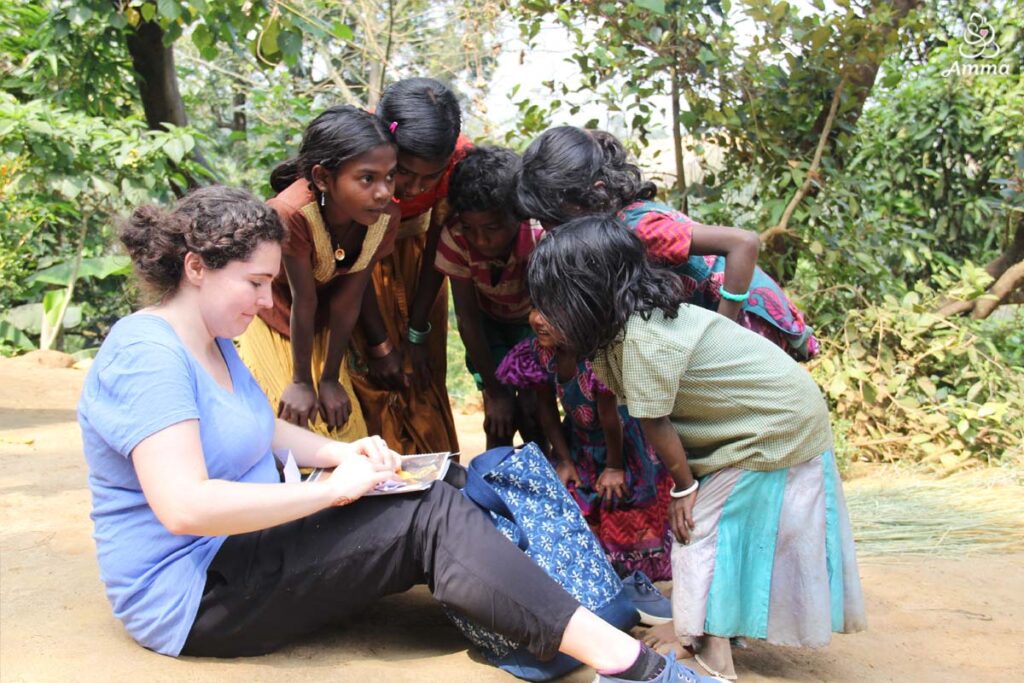
Awakening the truth within
Spirituality is the science of the mind. An expert swimmer will enjoy ocean waves; others will drown. Spirituality teaches us how to face life’s challenges.
There are two types of education—one for life, one for livelihood. Students study to become a doctor, an engineer or to take up some other profession. That is all to earn a living. The second kind of education is for life itself. This must be given top priority.
It is this education that gives us a thorough understanding of the nature of the world and its objects. It teaches us to recognise our emotions and how to manage them. It allows us to see things in their appropriate place and proceed accordingly.
Education should awaken a person’s awareness of their deep and inseparable connection with their nation, the world, fellow beings, nature, all living creatures and God. Lessons of love and friendship, mutual help and cooperation, discipline and dedication to duty, obedience, humility, forgiveness… How many such precious lessons can we learn from education!
One can learn not just from their teachers. One can learn from peers, from nature and from experiences. Such learning should continue throughout our life. Our education becomes complete only when we learn to live in love and harmony with all living beings. Therefore, along with “education for livelihood,” we also must give importance to “education for life.”
In the pursuit of knowledge, we shouldn’t dismiss anything as “true” or “false.” We must seek knowledge free from prejudice and dive deep into its depths.
A revolution of love
Meditation and spirituality are essential components of life. If we want to achieve clarity and precision in thought and action, a meditative mind and spiritual understanding are necessary. When thoughts reduce, the mind becomes sharper and more powerful, tuning itself more closely to the universe. That is when we begin to perceive the unseen dimensions of knowledge. Such a mind becomes like a mirror in which we can clearly see ourselves.
If we learn to see the world through the eyes of wisdom and offer comfort to the suffering with hands of compassion, we will definitely reach the shore of peace and joy. Let us unite the streams of material and spiritual wisdom from across the world into one great river. Let this river offer the water of life to the human race and let it create lush gardens of good culture.
Any revolution, regardless of its form or who leads it, should strive for constructive and dharma-based transformation. To serve the people without bias—that is the true aim of any revolution. If that is truly the goal, then there is only one path forward: we must usher in a revolution of love. That is the only real revolution. Only the power of love can create a true revolution.
This revolution should happen first in the individual mind. From there, it must spread to one’s home and society. The rest will happen spontaneously. If that is achieved, our dreams of a noble society will be fulfilled in a meaningful way.
AI for the good of the world
There is nothing wrong in incorporating Artificial Intelligence into our education curriculum. However, it’s possible it could hamper some people’s intellectual development. For instance, if we compare students who learned mathematics in earlier times to those who did so using calculators, we often find that the older generation is quicker at solving problems than today’s students using calculators. This is because they had invoked the abilities within them.
When we were children, if we made a spelling mistake, we were asked to write the word 100 times. Repeating it so many times helped imprint it firmly in our mind. This practice not only improved our memory but also nurtured our abilities and supported our mental development.
If two AI systems were to converse, after a few exchanges, silence would likely follow. Some experiences are beyond the scope of language. For instance, if someone consumes poison, can they precisely name which poison it was? Can anyone truly describe the taste of sugar?
We are increasingly becoming enslaved to objects and machines. As this dependence grows, some of our natural abilities may fade. Let AI progress and thrive—but if other areas of research and development do not advance alongside it, it could lead us to dangerous ground. This doesn’t mean we must hold back. When society moves forward, we must move along with it. But there is a scope for danger.
Nothing is impossible
Three essential factors are required to bring fulfilment to any action: time, effort and divine grace. For instance, imagine we must travel a long distance to attend an important auction. We wake up early, get ready and set out for the airport. On the way, the car may break down, causing a delay that derails the entire plan.
But let us assume everything goes smoothly, and we reach the airport on time. Still, we may find out that the flight has been cancelled due to a technical issue or poor weather conditions, and we miss the auction.
In these scenarios, we exerted sincere effort at the right time—but without divine grace, success remained elusive. Thus, divine grace is what ultimately makes an action fruitful. To earn that grace, we must lead a life filled with noble actions. The foundation for receiving divine grace is gratitude towards everything.
Human effort has its limitations, so too human strength. But wherever hands are willing to strive and there is heartfelt prayer, there the infinite power of the universe rushes in to provide support. Then nothing will be impossible. May such effort arise from our midst. May the divine grace of that universal power bless us all.
॥ ॐ लोकाः समस्ताः सुखिनो भवन्तु ॥
Om Lokah Samasthah Sukhino Bhavantu
May all beings everywhere be happy and free.


